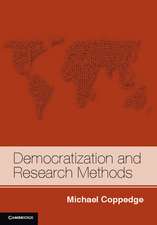The Politics of Military Reform: Experiences from Indonesia and Nigeria: Global Power Shift
Editat de Jürgen Rüland, Maria-Gabriela Manea, Hans Bornen Limba Engleză Paperback – 15 oct 2014
| Toate formatele și edițiile | Preț | Express |
|---|---|---|
| Paperback (1) | 557.46 lei 38-44 zile | |
| Springer Berlin, Heidelberg – 15 oct 2014 | 557.46 lei 38-44 zile | |
| Hardback (1) | 565.64 lei 38-44 zile | |
| Springer Berlin, Heidelberg – 4 sep 2012 | 565.64 lei 38-44 zile |
Din seria Global Power Shift
-
 Preț: 357.43 lei
Preț: 357.43 lei - 15%
 Preț: 642.51 lei
Preț: 642.51 lei - 20%
 Preț: 569.00 lei
Preț: 569.00 lei - 15%
 Preț: 644.30 lei
Preț: 644.30 lei - 15%
 Preț: 640.71 lei
Preț: 640.71 lei - 18%
 Preț: 999.73 lei
Preț: 999.73 lei - 18%
 Preț: 1114.96 lei
Preț: 1114.96 lei - 15%
 Preț: 640.02 lei
Preț: 640.02 lei - 15%
 Preț: 705.34 lei
Preț: 705.34 lei - 18%
 Preț: 1126.35 lei
Preț: 1126.35 lei - 18%
 Preț: 2088.15 lei
Preț: 2088.15 lei - 15%
 Preț: 702.54 lei
Preț: 702.54 lei - 15%
 Preț: 646.11 lei
Preț: 646.11 lei - 15%
 Preț: 698.47 lei
Preț: 698.47 lei - 18%
 Preț: 896.21 lei
Preț: 896.21 lei - 15%
 Preț: 698.62 lei
Preț: 698.62 lei - 18%
 Preț: 779.89 lei
Preț: 779.89 lei - 15%
 Preț: 691.76 lei
Preț: 691.76 lei - 15%
 Preț: 699.59 lei
Preț: 699.59 lei - 15%
 Preț: 692.24 lei
Preț: 692.24 lei - 18%
 Preț: 721.51 lei
Preț: 721.51 lei - 18%
 Preț: 729.84 lei
Preț: 729.84 lei -
 Preț: 381.98 lei
Preț: 381.98 lei - 18%
 Preț: 779.39 lei
Preț: 779.39 lei - 18%
 Preț: 783.98 lei
Preț: 783.98 lei - 18%
 Preț: 733.46 lei
Preț: 733.46 lei - 24%
 Preț: 602.56 lei
Preț: 602.56 lei - 18%
 Preț: 786.84 lei
Preț: 786.84 lei -
 Preț: 455.12 lei
Preț: 455.12 lei - 9%
 Preț: 789.77 lei
Preț: 789.77 lei
Preț: 557.46 lei
Preț vechi: 696.82 lei
-20% Nou
Puncte Express: 836
Preț estimativ în valută:
106.70€ • 115.94$ • 89.69£
106.70€ • 115.94$ • 89.69£
Carte tipărită la comandă
Livrare economică 17-23 aprilie
Preluare comenzi: 021 569.72.76
Specificații
ISBN-13: 9783642430480
ISBN-10: 3642430481
Pagini: 260
Ilustrații: XX, 240 p.
Dimensiuni: 155 x 235 x 14 mm
Greutate: 0.37 kg
Ediția:2012
Editura: Springer Berlin, Heidelberg
Colecția Springer
Seria Global Power Shift
Locul publicării:Berlin, Heidelberg, Germany
ISBN-10: 3642430481
Pagini: 260
Ilustrații: XX, 240 p.
Dimensiuni: 155 x 235 x 14 mm
Greutate: 0.37 kg
Ediția:2012
Editura: Springer Berlin, Heidelberg
Colecția Springer
Seria Global Power Shift
Locul publicării:Berlin, Heidelberg, Germany
Public țintă
ResearchCuprins
Part I: Introduction.- Part II: Military Reform in Indonesia and Nigeria.- Part III: Legislatures and Non-State Actors in Military Reform.- Part IV: Rogue Forces and Military Reform.- Part V: Conclusion.
Notă biografică
Jürgen Rüland is Professor at the Department of Political Science, University of Freiburg, Germany, and Chairman of the university's Southeast Asian Studies Program. He has published extensively on Southeast Asian politics and security issues in journals such as the European Journal of International Relations, Journal of European Public Policy, The Pacific Review, Pacific Affairs, Asian Survey, International Relations of the Asia-Pacific, Contemporary Southeast Asia, European Journal of East Asian Studies, Asia Europe Journal and Security Dialogue. He is co-author of Parliaments and Political Change in Asia (2005), and co-editor of Asian Security Reassessed. Contemporary Policies and New Challenges (2006).
Maria Gabriela Manea is a Lecturer at the Department of Political Science, University Freiburg, Germany. Her publications appeared in The Pacific Review and Cooperation and Conflict.
Hans Born is a Senior Fellow at the Centre for the Democratic Control of Armed Forces (DCAF), Geneva, Switzerland, where he heads the DCAF's research working groups on Parliamentary Accountability of the Security Sector and Legal Aspects of Security Sector Governance. He co-authored Security Sector Reform in Transitional Societies (2002), Parliamentary Oversight of the Security Sector: Principles, Mechanisms and Practices (2003) and The "Double Democratic Deficit": Parliamentary Accountability and the Use of Force under International Auspices (2004).
Maria Gabriela Manea is a Lecturer at the Department of Political Science, University Freiburg, Germany. Her publications appeared in The Pacific Review and Cooperation and Conflict.
Hans Born is a Senior Fellow at the Centre for the Democratic Control of Armed Forces (DCAF), Geneva, Switzerland, where he heads the DCAF's research working groups on Parliamentary Accountability of the Security Sector and Legal Aspects of Security Sector Governance. He co-authored Security Sector Reform in Transitional Societies (2002), Parliamentary Oversight of the Security Sector: Principles, Mechanisms and Practices (2003) and The "Double Democratic Deficit": Parliamentary Accountability and the Use of Force under International Auspices (2004).
Textul de pe ultima copertă
This volume seeks to explain why democratization and military reforms stagnate in newly democratizing countries. The contributions blend historical, ideational, cultural and structural explanatory factors to analyze the trajectories of military reform in Indonesia and Nigeria, two major regional powers that share many structural commonalities. In the tradition of the literature on security sector reform (SSR), the book not only scrutinizes executive initiatives toward military reform, but also provides ample coverage of societal actors. Findings show that while military reform is stagnating in both countries, societal forces ought to be taken into account more as major driving forces in explaining military reform. Several chapters study how legislatures, non-governmental organizations and the civilian defence epistemic community contribute to the transformation of military institutions. The last part of the book tackles another aspect rarely studied in the literature on military reform, namely, the role of militias in military reform.
Caracteristici
Informs the reader on latest developments of military reform in newly democratizing countries Shows why democratization and military reforms stagnate Provides insights in latest developments of political change in two leading regional powers Includes supplementary material: sn.pub/extras
















